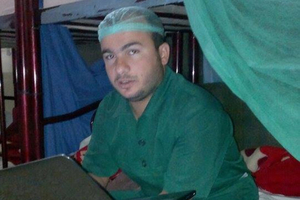By Donatella Rovera, Amnesty International’s Senior Crisis Response Adviser
A 19-year-old labourer, a 27-year-old bus driver, a 28-year-old nurse, a 30-year-old driver, a tribal leader, a former army officer, a lawyer; the list of the dead goes on. These and several other men were all killed in the past two weeks in the oil-rich city of Kirkuk, 240 km north of Iraq’s capital, Baghdad.

Most of the victims are Sunni Muslims, Turkmen and Arabs. Many in their community believe that they were abducted and killed in revenge for a triple bomb attack which targeted Kurdish forces in Kirkuk on 23 August, for which the Islamic State (IS) has claimed responsibility.
Some were abducted near their homes; their bodies dumped nearby, each with a bullet to the head. Others were gunned down by men in passing cars. In both cases the killings look like the work of “professionals”. A single lethal shot to the head for those abducted and a hail of bullets for the targets of on-the-run attacks.
The father of one of the victims told me: “My boy left home at 9.30 pm and a little later my other son called me and said I should go to the hospital. When I got there I found my boy dead. He had been shot in the back of the head. His body and the bodies of two other young men were found on a rubbish dump on the south side by the wadi (dry river-bed) opposite the animal market.”
Parents and relatives of two other young men who were abducted in the same area at around the same time also told me their relatives had been shot in the back of the head.
One of them, a bus driver, was abducted in front of his home while he was repairing the bus he drove. The other, a nurse, was seized as he went to help a sick relative who lived near his home. The father of another of the three victims said he found his son’s body in the morgue. “He had been shot in the back of the head and on his wrists there were signs that his hands had been cuffed together,” he said.
A young man who was injured but survived a shooting attack on the evening of 25 August which left his uncle and another man dead told me: “We were outside the bakery, waiting for the electricity to come back on, when we were struck by a hail of bullets fired from a passing car. My uncle and the baker were killed on the spot, my niece and I were injured”.
Other men who were abducted in the past two weeks and have not been heard of since are also feared dead.
These abductions and murders are taking place against a background of increasing sectarian tensions among Kirkuk’s main ethnic groups – Kurds, Turkmen and Arabs – who have long battled for control over the city and its large oil resources.
Who is responsible for these brutal murders? What has happened to those who have been abducted?
Rumours and conspiracy theories about who the perpetrators may be are rife. The sectarian divisions which have long existed in Iraq have been further exacerbated since the takeover of large parts of northern Iraq by IS last June. Since then, divisions and mistrust have grown between Sunni and Shi’a Turkmen and Arab communities and between Arabs and Kurds. Accusations such as “the Sunnis [Turkmen and Arabs] are cooperating with IS” and “the Shi’a [Turkmen] and the Kurds are cooperating with Iran-backed Shi’a militias” are common.
“This business of IS and the war which it has caused has poisoned relations among and within communities. Sunni or Shi’a did not use to matter, now some people are exploiting the situation and causing dangerous divisions,” a resident of the city told me.
In the absence of any recourse to justice, families of victims have little hope of finding the truth about who is behind the attacks. Since the Iraqi army and security forces fled the whole of northern Iraq last June, Kirkuk has been under the control of the forces of the autonomous Kurdistan Regional Government (KRG). The KRG has long claimed sovereignty over Kirkuk and has frequently reiterated that claim in recent weeks.
In theory, the administration of justice remains the responsibility of the Iraqi central government in Baghdad. In practice, it seems to have neither the will nor the capacity to enforce the law in Kirkuk. Not only have families of victims given up on the hope of obtaining justice and redress, but they are also scared. “Who knows who will be next? There is no rule of law, no protection,” a relative of one of the victims told me.
“KRG forces control the Kirkuk, but they did not stop armed Shi’a militias parading through the city with their weapons on display some weeks ago, while we Sunnis are regarded with suspicion and treated as if we are all members of the Islamic State,” another resident told me.
As I was saying goodbye to the family of another victim before leaving Kirkuk, another bomb went off in the city, a pertinent reminder of the violence that has enveloped the city.
Another more mundane signal of the how deep divisions between Arabs and Kurds have become came as we approached a Kurdish checkpoint on the way from Kirkuk back to Erbil. The taxi driver reminded me “don’t speak Arabic please, the Peshmerga [KRG forces] will delay us”.
This blog originally appeared on the Open Democracy website.


